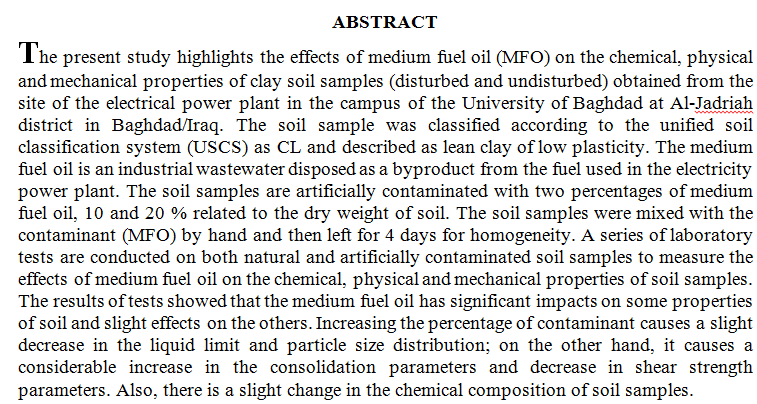
Petrophysical properties evaluation from well log analysis has always been crucial for the identification and assessment of hydrocarbon bearing zones. East Baghdad field is located 10 km east of Baghdad city, where the southern area includes the two southern portions of the field, Khasib formation is the main reservoir of East Baghdad oil field.
In this paper, well log data of nine wells have been environmentally corrected, where the corrected data used to determine lithology, shale volume, porosity, and water saturation. Lithology identified by two methods; neutron-density and M-N matrix plots, while the shale volume estimated by single shale indicator and dual shale indicator, The porosity is calculated from the three common po
... Show Moreten albino male rates were orally treated daily 20% and 30% ethanol for 30 days treatment with 30%ethanol caused of hippocampuse of darckness google hospital patients
Oilwell cementing operations are crucial for drilling and completion, preserving the well's productive life. However, weak and permeable formations pose a high risk of cement slurry loss, leading to failure. Lightweight cement, like foamed cement, is used to avoid these difficulties. This study is focused on creating a range of foamed slurry densities and examining the effect of gas concentration on their rheological properties. The foaming agent and foam stabilizer are tested, and the optimal concentration is determined to be 2% and 0.12%, respectively, by the weight of the cement.
Furthermore, the construction of samples of foam cement with different densities (0.8, 1.0, 1.2, 1.4, and 1.6) g/cc is performed to f
... Show MoreZnS thin films were grown onto glass substrates by flash evaporation technique, the effects of ? – rays on the optical constants of ZnS these films were studied. It was found that ? – rays affected all the parameters under investigation.
This paper aims to investigate the flexural behavior of reinforced concrete beams considering fire resistance by adding Lightweight Expanded Clay Aggregates (LECA) to the concrete mix as partial coarse aggregate replacement. LECA is a type of porous clay with a uniform pore structure with fine, closed cells and hard, tightly sintered skin. The experimental work comprised four reinforced self-compacted concrete beams. All the specimens were identical in their geometrical layout of 1600×240×200 mm, reinforcement details, and support condition (simply supported). For all the beams, the main reinforcement was provided by two bars, each having a diameter of 12 mm, while a bar of 6 mm diameter was employed for the top and shear reinforc
... Show More (7)
(7)
 (6)
(6)
A many risk challenge in (settings hospital) are multi- bacteria are antibiotic-resistant. Some type strains that ability adhesion surface-attached bio-film census. Fifteen MRSA isolates were considered as high biofilm producers Moreover all MRSA isolates; M3, M5, M7 and M11 produced biofilms but the thickest biofilm seen M7strain. The MIC values of N. sativa oil against clinical isolates of MRSA were between (0.25, 0.5, 0.75, 1.0) μg/ml While MRSAcin (50, 75, 100, 125) µg\ ml. All biofilms treated with MRSAcin and Nigella sativa developed a presence of live cells after cultured on plate agar with inhibition zone between MIC (18 – 15) and (14- 11)mm respectively.Yet, results showed that MRSA supernatant developed a inhibitory ef
... Show More (3)
(3)
 (3)
(3)
This research presents a study in ultra-desulfurization of diesel fuel produced from conventional hydro desulfurization process, using oxidation and solvent extraction techniques. Dibenzothiophene (DBT) was the organosulfur compound that had been detected in sulfur removal. The oxidation process used hydrogen peroxide as an oxidant and acetic acid as homogeneous catalyst . The solvent extraction process used acetonitrile (ACN) and N-methyl – 2 - pyrrolidone (NMP) as extractants . Also the effect of five parameters (stirring speed :150 , 250 , 350 , and 450) rpm, temperature (30 , 40 , 45 , and 50) oC, oxidant/simulated diesel fuel ratio (0.5 , 0.75 , 1 , and 1.5) , catalyst/oxidant ratio(0.125,0.25,0.5
... Show MoreTwelve pends were selected and distributed on three verticals transects paths on the Tigers river in Al Rasheed county.Passing through land covers, that classified and covers the whole region. Based on the 8 Landsat of the year 2015. It was oriental classified by using Erdas 10.2 . The pedons were distributed on the area of each varicty of these classes. the series of soil according of the transect series (DW74,MMg,DMu6 , Df96) respectively were represented P1 , P2 , P3 , P4 .
The second transits series(DM97,MM5,DM96,DF115) respectively were represented P5 , P6 , P7 , P8 .The third transits series(DM46,MMg,MF12,MM11) re
... Show MoreAbstract Background: The daily usage of maxillofacial prostheses causes them to mechanically deteriorate with time. This study was aimed to evaluate the reinforcement of VST50F maxillofacial silicone by using yttrium oxide (Y2O3) nanoparticles (NPs) to resist aging and mechanical deterioration. Materials and Method: Y2O3 NPs (30–45nm) were loaded into VST50F maxillofacial silicone in two weight percentages (1 and 1.5 wt%), which were predetermined in a pilot study as the best rates for improving tear strength with minimum increase in hardness values. A total of 120 specimens were prepared and divided into the control and experimental groups (with 1 and 1.5 wt% Y2O3 addition). Each group included 40 specimens, 10 specimens for each paramet
... Show More (4)
(4)
 (4)
(4)
This work deals with the production of light fuel cuts of (gasoline, kerosene and gas oil) by catalytic cracking treatment of secondary product mater (heavy vacuum gas oil) which was produced from the vacuum distillation unit in any petroleum refinery. The objective of this research was to study the effect of the catalyst -to- oil ratio parameter on catalytic cracking process of heavy vacuum gas oil feed at constant temperature (450 °C). The first step of this treatment was, catalytic cracking of this material by constructed batch reactor occupied with auxiliary control devices, at selective range of the catalyst –to- oil ratio parameter ( 2, 2.5, 3 and 3.5) respectively. The conversion of heavy vacuum gas
... Show More